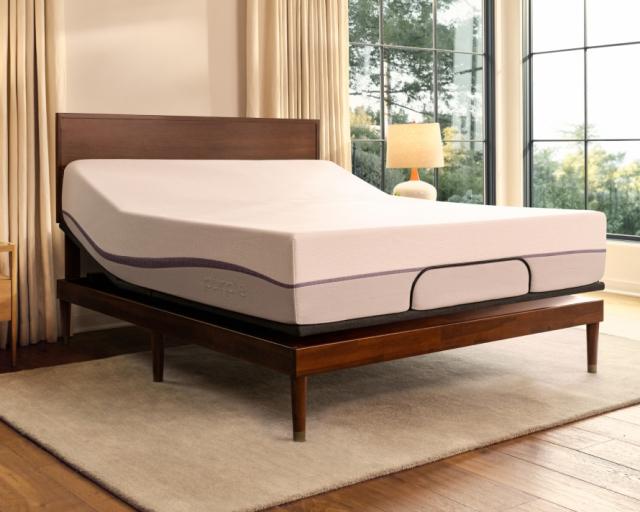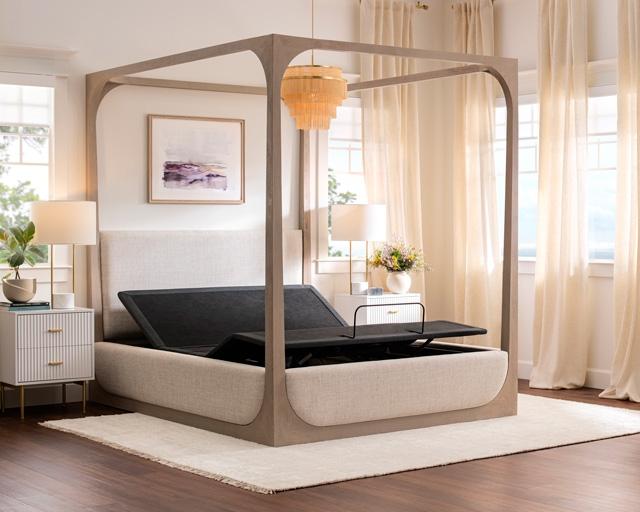Do Adjustable Beds Help With Snoring?
One in three adults don’t get enough sleep. The culprit? While sleep deprivation is caused by a number of things, snoring is among the top ten.
In fact, 48% of Americans who suffer from sleep disorders also report snoring. And although snoring isn’t bad on its own (except for our partners, who may have trouble sleeping next to our loud snoring), it can be a life-threatening condition when accompanied by sleep apnea.
So, what can be done? In recent years, adjustable beds have become an increasingly popular tool for combating snoring. But do they actually work? And how exactly do they minimize snoring? Keep reading to find out.
Purple’s adjustable bed frame is designed to improve your sleep quality and daily comfort. Providing premium customizable comfort to support your mattress. Elevate your sleeping position as needed when snoring.
What Is Snoring?
Snoring happens when air attempts to push through the soft tissues in your throat. When you sleep, your throat tissue relaxes, and the air that passes through causes them to vibrate and make a sound. If there isn’t good air flow or your air passage is blocked, it can create an even louder and more obtrusive noise.
Snoring is often linked with obstructive sleep apnea (OSA), a condition that causes your breathing to suddenly stop and start while you sleep. According to the Mayo Clinic, not everyone who snores will have obstructive sleep apnea. But if your partner/s complain about your excessive snoring and you happen to experience symptoms – restlessness at night, gasping and choking in your sleep, daytime sleepiness, inability to experience deep sleep, and having difficulty breathing during sleeping – then you should definitely consult with a doctor.
What Causes Snoring?
Snoring is caused by a variety of factors, including:
- Having mouth anatomy that is more prone to snoring
- Consuming excessive amounts of alcohol before bedtime
- Having narrow nasal passages, nasal congestion, a deviated septum, or other nasal problems
- Not getting enough restful sleep the previous night/s
- Sleeping in the flat position or lying squarely on your back
How Can You Prevent Snoring?
There is no one-size-fits-all solution to stopping snoring, as people snore for a number of different reasons and to varying levels of severity. Preventing snoring and sleep apnea usually involves a combination of the following things:
Lifestyle Changes
People who are overweight and obese are more likely to snore and develop OSA. One of the major lifestyle changes you can do to prevent snoring is to shed a few pounds.
Smoking and alcohol can also exacerbate snoring, so quit these two altogether if you can. If you don’t want to give them up, just make sure not to drink and smoke close to bedtime.
Surgical Treatments
Surgery is often considered as a last resort to treating snoring and OSA, mainly because it can be quite expensive. Depending on the root cause of your snoring problems, you may be advised to try laser-assisted uvulopalatoplasty, palatal implants, or somnoplasty.
Medical Devices
If surgery is too extreme for you, you can always try some of the many medical devices marketed towards heavy snorers. These require a bit of trial and error, so don’t expect to see results right away.
Some of the most popular devices include a nasal dilator, which is made of a flexible strip that opens the nasal passages, and an anti-snoring mouthpiece, which is like a mouthguard that is molded to your teeth.
Continuous positive airway pressure (CPAP) machines are also popular among those who experience OSA. These machines involve a mask or nose piece connected to a hose that is then hooked up to a machine that generates a steady stream of air to your airways.
Aside from price, one major drawback of wearing these devices at night is discomfort. Wearing a mask, nasal strip, or mouthguard all night is not a particularly enjoyable experience.
If you're interested in devices that can reduce snoring, you may also consider running a humidifier while you sleep. Improving the humidity in your bedroom means dry air won't make your snoring worse so you can sleep better.
If none of the above-mentioned methods pique your interest, then perhaps you’d like to consider an adjustable bed.
What Are Adjustable Beds?
Adjustable bases are motorized bed frames that elevate the head and/or feet areas of the mattress.
Adjustable bases were originally designed to enable better recovery for patients in hospitals. By re-positioning your body patients experienced proper blood flow and improved drainage.
In the 70’s adjustable bases were re-designed for in-home usage, transforming bedrooms into entertainment centers as couple say up in bed to watch tv or read.
Adjustable bases picked up popularity becoming mainstream in the 90’s as more affordable options as well as higher-end premium features became available. Adjustable bases enhance your lifestyle and are a health and wellness tool, adding increased comfort and improving physical recovery.
Solving sleep disruptions due to snoring and aiding sleep apnea problems is just one reason mattress shoppers are flocking to add an adjustable base to their sleep experience.
How Can Adjustable Beds Prevent Chronic Snoring?
Here are four ways adjustable beds can help people who snore:
Elevation Reduces Pressure
Elevation with an adjustable bed reduces pressure on airway and nasal passages.
Purple bases have an anti-snore preset that adjusts the elevation at just the right angle. This is also great for when you are congested or have acid reflux
Adjustable Beds Distribute Weight More Evenly
By distributing your weight more evenly across the bed, an adjustable bed can take the pressure off your upper body and neck.
This weight distributing factor also has an indirect effect on users’ quality of sleep. By relieving pressure off certain areas, those who suffer from chronic pain conditions can get a better night’s sleep. Some adjustable beds even come with an anti-snore and zero-gravity preset, as well as massage options.
They Help You Sleep In The Most Ergonomic Positions
For snorers, the ideal position is side sleeping. However, many people find sleeping on their side too uncomfortable, especially if they have back and hip problems. Adjustable beds allow users to find that sweet spot in head and feet elevation so that snorers can comfortably sleep on their sides and minimize their snoring.
Aside from preventing snoring, adjustable beds also help to prevent medical conditions like acid reflux. People with gastroesophageal reflux disease (GERD) tend to get heartburn or acid reflux if they lie flat on their backs. By putting the head in a more elevated position, adjustable beds can keep stomach acids from going all the way up to the esophagus and throat.
They Lessen The Need For Traditional Pillows
Back sleepers sometimes try to remedy their snoring by using multiple pillows to elevate their heads. However, pillows can slip and fall off during sleep, leaving sleepers in even more uncomfortable and less-than-optimal sleeping positions.
With the elevation provided by an adjustable bed, you won’t need to use multiple pillows again.
They’re Compatible With Anti-Snoring Devices And CPAP Machines
You can still continue to use your anti-snoring devices and CPAP machines together with your adjustable bed. Just think of them as tools that work together to provide you with the best sleep quality possible.
Note: If you share your mattress, a split king will allow you and your partner to customize your bed separately.
Which Adjustable Bed Is Best For Snoring?
Break free of your snoring woes, and get just the right amount of sleep that you need to feel well-rested and recharged the following day!
One of the best beds for snoring is Purple’s Premium Smart Base, which provides customizable support for maximum comfort and relaxation. In the Zero-Gravity position, you can enjoy a nearly weightless feeling for soothing pressure relief. It also comes with a wireless remote for easy adjusting to different height options and accommodates different kinds of bed frames and mattresses, including GelFlex Grid®, memory foams, innerspring mattresses, and hybrid mattresses that are compatible with adjustable frames.




